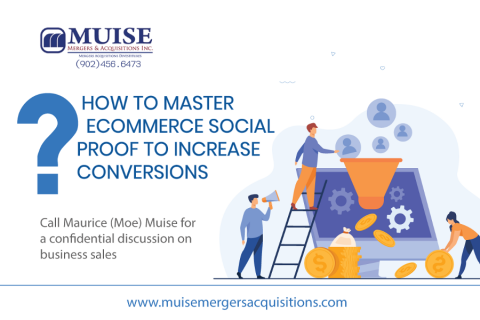How to Master Ecommerce Social Proof to Increase Conversions

Many eCommerce business owners look for methods to demonstrate their thanks for their clients during this extraordinary moment. What can entrepreneurs add to orders to make customers feel unique and brighten their day?
Simple, meaningful gestures are frequently the answer. Here are some of our favourite customer and brand loyalty initiatives being pursued by eCommerce businesses..
1. Writing handwritten notes.
An organic skincare business. Em & El Organics includes a handmade thank-you message specially addressed to each customer with every order. Trower-Young says, "As an eCommerce business owner, I genuinely cherish our consumers and how we communicate with them—whether it's answering emails, commenting on our social media channels, or speaking with them on the phone.
2. Illustrating packaging and note cards with cartoons.
When you get a gift in the mail with amusing, hand-drawn graphics or artwork on it, it's impossible not to smile. Some consumers may keep decorated packaging and handwritten messages in their packages. With these annotations, he now includes cartoons.
Williamson explains, "We sketch a small cartoon on a notecard." "Every time a consumer sees it, we hope the cartoon will make them smile." Rather than throwing it out. CBDiablo UK's owner, Sam Williamson, has always included. For Williamson's eCommerce firm, cartoons have become a bonus with purchase. Customers can request a specific cartoon for their notecards by filling out a form on their company's website. It does not only help to create a smile on consumers' cheeks, but it also keeps the CBDiablo team's creative ideas running. "So far, we've got some fascinating requests that have pushed our artistic abilities!" According to Williamson.
3. Creating customer-based gallery pages on websites.
Many retailers, particularly those in the fashion industry, encourage customers to photograph their purchases and share them on social media using branded hashtags. It allows the customer's network of admirers to see how the clothing looks and fits and provides an opportunity for the firm to communicate with happy consumers through social media marketing.
Robert Remake, Co-Owner of Art of the Gentleman, has gone a step further with social media sharing. His clothing company has created a gallery page that features client outfits. Customers are invited to take images of their new purchases, follow the brand on Instagram, and message the photographs to be included in the customer gallery.
4. Mailing out free samples.
Laurel Crest’s VP of Marketing and Sales, Danielle Bernstein, is a wholesale CBD provider. Before COVID-19, the corporation sent client orders with samples of new products. They continue to do so because free samples are more important than ever for internet firms. According to Bernstein, "these samples let customers learn more about your product line, motivate future orders, and stimulate repeat shopping." Free samples, according to Bernstein, might be cost-effective depending on the sort of business. Because Laurel Crest makes all of its products, delivering pieces is a simple way to thank consumers and express gratitude.
5. Donating to non-profits.
Jessica Rose is the CEO of Copper H2O, a health and wellness e-commerce social venture run entirely by women. Rose has a more subtle way of expressing gratitude to clients. Copper H2O has developed a strategy to demonstrate to customers how supporting their business directly influences the community after watching how communities all over the world came together during COVID-19.
Copper H2O has had an excellent karma program for a long time. This program allows them to donate 15% of their sales to charitable organizations that provide safe drinking water to people in developing countries. These proceeds have been contributed to the charity that supports corona from the beginning of COVID-19. Relief efforts, including the donation of N95 masks to hospitals.
According to Rose, this is correct — and it gives clients a wonderful feeling. "Our buyers have a certain feeling of knowing that buying them would support a dignified cause." "This demonstrates to our clients that our community is much more important than the end."



